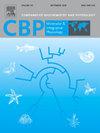食物摄入和慈鲷的HPT轴:肠脑肽胆囊收缩素的意义。
IF 2.1
3区 生物学
Q4 BIOCHEMISTRY & MOLECULAR BIOLOGY
Comparative Biochemistry and Physiology A-Molecular & Integrative Physiology
Pub Date : 2025-01-13
DOI:10.1016/j.cbpa.2025.111813
引用次数: 0
摘要
本研究旨在探讨罗非鱼(Oreochromis mossambicus)饥饿时胆囊收缩素(CCK)的反应及其对摄食和生殖轴的影响。饥饿21 天的鱼显示下丘脑、脑垂体和肠道的CCK免疫反应性显著降低。在21 天内注射0.5和5 μg的硫酸CCK-8 (CCK-8S)导致食物消耗显著的剂量依赖性减少。高剂量CCK-8S(5 μg)可导致各种生精细胞数量、睾丸雄激素受体免疫反应强度和垂体远端部gnrh免疫反应纤维百分比面积显著减少,同时血清黄体生成素(LH)和11-酮睾酮(11-KT)水平显著下降。CCK-8S处理显著降低体外睾丸11-KT水平。结果首次表明CCK影响下丘脑GnRH释放到垂体,导致垂体LH释放抑制,影响硬骨鱼睾丸精子发生、雄激素受体蛋白表达和类固醇生成。此外,CCK也可能直接影响睾丸甾体生成。本文章由计算机程序翻译,如有差异,请以英文原文为准。

Food intake and the HPT axis in the cichlid fish: The implications of the gut-brain peptide cholecystokinin
This work aimed to investigate the response of cholecystokinin (CCK) to starvation and its impact on food intake and the reproductive axis of the tilapia Oreochromis mossambicus. The fish subjected to 21 days of starvation showed a significant decrease in CCK immunoreactivity in the hypothalamus, pituitary gland, and intestine. The administration of injections of 0.5 and 5 μg of sulfated CCK-8 (CCK-8S) over 21 days resulted in a significant, dose-dependent decrease in food consumption. Administration of a high dose of CCK-8S (5 μg) caused a substantial decrease in the number of various spermatogenic cells, the intensity of androgen receptor immunoreactivity in the testis, and the percentage area of GnRH-immunoreactive fibres in the pars distalis of the pituitary gland (PPD), concurrent with a significant decline in serum levels of luteinizing hormone (LH) and 11-ketotestosterone (11-KT). Moreover, CCK-8S treatment markedly reduced the in vitro testicular 11-KT level. The findings indicate for the first time that CCK influences hypothalamic GnRH release into the pituitary gland, resulting in the inhibition of LH release from the pituitary and affecting testicular spermatogenesis, androgen receptor protein expression, and steroidogenesis in teleosts. In addition, CCK may also directly affect testicular steroidogenesis.
求助全文
通过发布文献求助,成功后即可免费获取论文全文。
去求助
来源期刊
CiteScore
5.00
自引率
4.30%
发文量
155
审稿时长
3 months
期刊介绍:
Part A: Molecular & Integrative Physiology of Comparative Biochemistry and Physiology. This journal covers molecular, cellular, integrative, and ecological physiology. Topics include bioenergetics, circulation, development, excretion, ion regulation, endocrinology, neurobiology, nutrition, respiration, and thermal biology. Study on regulatory mechanisms at any level of organization such as signal transduction and cellular interaction and control of behavior are also published.

 求助内容:
求助内容: 应助结果提醒方式:
应助结果提醒方式:


